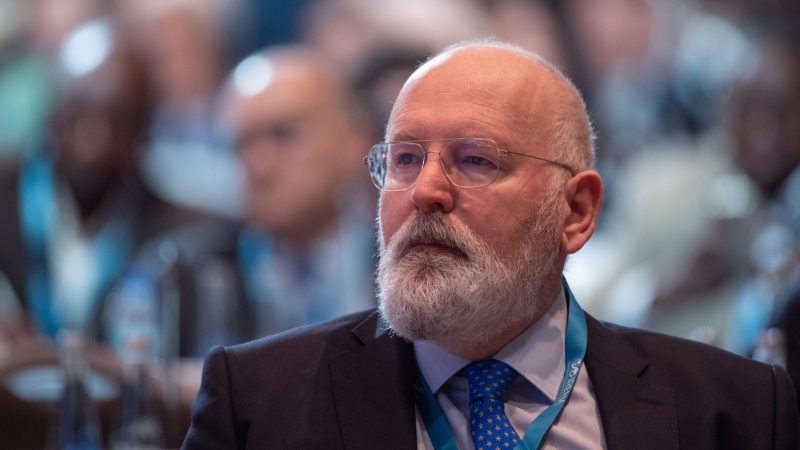
Africa is likely to be Europe’s most important partner as it looks to increase its renewable energy supply and switch to green hydrogen, EU climate chief Frans Timmermans told EURACTIV in an exclusive interview.
“The continent of Africa is probably going to be the most important partner for Europe in terms of developing the renewable energy sector,” said Timmermans during an interview at the International Renewable Energy Agency (IRENA) assembly in Abu Dhabi.
While Europe is growing its domestic renewable energy production, it will also need to look beyond its borders to secure the levels it needs. To help fill the gap, many in the EU are looking to Africa, where there is a high potential for renewable energy production – in particular solar power.
“You start with your proximity,” said Timmermans, pointing to potential partnerships with the wider Mediterranean and North Africa.
This includes plans to import renewable electricity from Egypt to Greece via an undersea cable already under construction.
The submarine cable, which has a budget of €3.5 billion, will be able to carry 3,000 megawatts of power from Egypt to Greece, replacing 4.5 billion cubic metres of fossil gas each year, according to the Copelouzos Group developing the project.
Morocco is another obvious candidate for a cable link to Europe as their renewable energy sector is being developed, said Timmermans.
For countries further away, he pointed to the role hydrogen can play in bringing renewable energy to Europe. Hydrogen can be produced using green electricity and then transported wherever the energy is needed.
“The European Union will need more green hydrogen than we can produce ourselves, so we’re looking for countries where green hydrogen can be produced,” Timmermans told EURACTIV.
There are already several venues for collaborations between the EU and Africa regarding renewables, including the EU-Africa energy partnership, which looks to increase access to affordable and sustainable energy services, support renewable energy investments and promote energy efficiency on the continent.
The EU has also signed a memorandum of understanding with Namibia on critical raw materials and hydrogen, which aims “to ensure the development of a secure and sustainable supply of raw materials, refined materials and renewable hydrogen to support the green and digital transformation of the partners’ economies”.
In addition, there is the EU-Egypt Renewable Hydrogen Partnership, which looks at establishing long-term cooperation on green hydrogen to accelerate the decarbonisation of energy systems.
However, Spanish ecological transition minister Teresa Ribera says EU cooperation with foreign nations can take different forms, with the needs and potential varying greatly from one country to another.
“There are some countries that would be ideal to host the small scale solutions that can make a big difference from the starting point. Other countries are ready to go for a much more industrial transformation in the energy system, modernising the grids and so on,” she told EURACTIV at the IRENA assembly.
The EU needs to strengthen its relationship with North African countries, which have similar geographical and climate conditions to much of southern Europe, she said. Meanwhile, she wants Europe to be more present in Central African countries, but with a different approach, looking at fairness and access to opportunities.
For the wealthy oil and gas producing countries, such as those in the Middle East, “it is important to ensure that the real transformation of their own economies takes place”, said Ribera.
“I think that the dialogue, the cooperation on how to organise this energy transition, how to facilitate a dialogue to be sure that we invest where we need to invest is also important, particularly in this energy turmoil that we are going through,” she said.
But as Europe seeks to replace Russian gas with alternatives, it should also be aware of the impact its scramble for energy has on international markets, particularly if it increases prices and limits access for other countries.
“Europe should also be providing additional support to ensure that others do not suffer because of the European response,” she said.
Tackling energy poverty in Africa
Cooperation is not just about ensuring supplies for Europe, it is also about developing infrastructure and improving Africa’s access to energy, said Philippe Henry, the climate and energy minister of Belgium’s Wallonia region.
Under half of the population in West Africa has access to electricity, according to the World Bank. And close to 600 million people in sub-Saharan Africa lack electricity connections.
Belgium was a vice-president of the IRENA assembly and Henry told EURACTIV it is important that the renewable energy agency is engaged in UN climate talks as renewables are key to tackling climate change.
Indeed, the transition to clean energy in regions like Africa could be a shortcut to increasing energy access, said UNDP administrator Achim Steiner, who speake to journalists in Abu Dhabi.
“Why do we think that Africa deserves the attention of the world from an access to clean energy point of view? One, because it’s fundamental to development. Secondly, because it is also in the interest of the world not to have an African continent that is forced by default, to invest in a 20th century, carbon-intensive infrastructure for power and transport,” he explained.
He called on Europe, the US and other OECD countries to mobilise funding, similar to the money used to get out of the COVID pandemic, to provide financial stimulus for the energy transition in developing countries.
Similarly, IRENA director general Francesco La Camera emphasised the need to reassess the role of multilateral financial institutions, as well as governments and other actors, to reach the goals of the Paris Agreement.
“We have to rewrite the way that international cooperation works because it does not work effectively if you want to stay in line with the Paris Agreement goal,” La Camera said.
That includes multilateral finance institutions working on building up infrastructure using capital from their members and finding a way to work with utilities and the private sector, he said.










